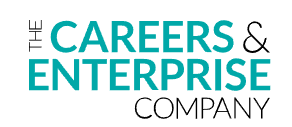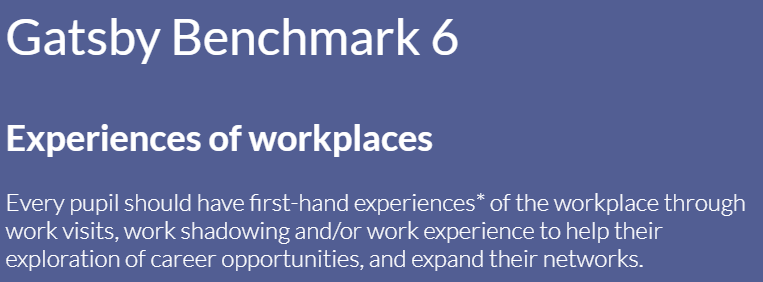Parent and Student Zone
Careers Team and roles within the team
- Mrs Hyland – Careers Link Governor: Careers Programme and External Careers Contacts (denise.hyland@royalgreenwich.gov.uk)
- Ms Hepburn – Vice Principal Inclusion and Careers (michelle.hepburn@stpauls.greenwich.sch.uk)
- Ms Banbrook – Careers Adviser (vicki.banbrook@stpauls.greenwich.sch.uk)
- Mr Davis – Career Lead (gordon.davis@stpauls.greenwich.sch.uk). Telephone: 02083113868 Ext 194
If you would like to speak with Mr. Davis, about anything career related, please contact us.
Supporting you and your child's future
At St. Paul’s Academy, we know how important your child’s future is to you—and it’s just as important to us. Our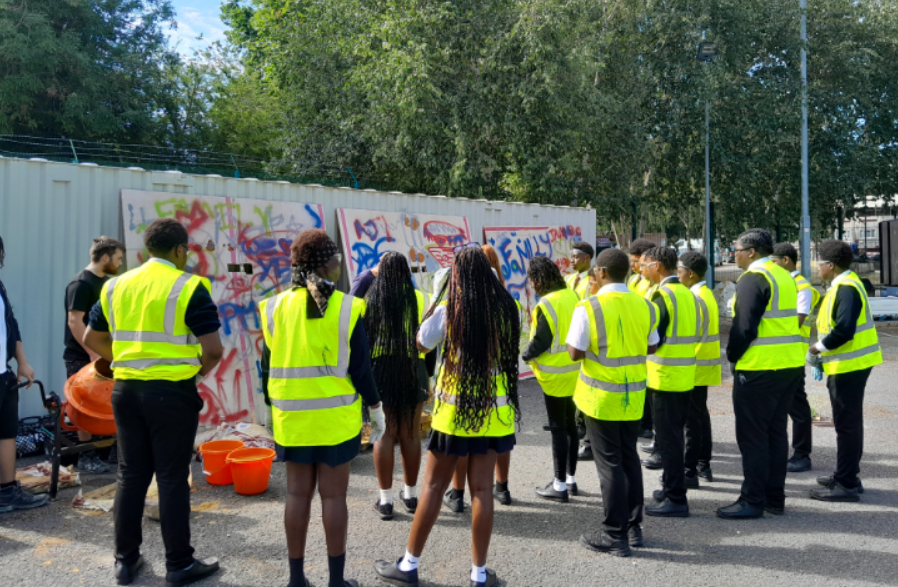 commitment is to work in partnership with parents and carers to make sure every student has the guidance, skills, and opportunities they need to achieve their very best.
commitment is to work in partnership with parents and carers to make sure every student has the guidance, skills, and opportunities they need to achieve their very best.
This Parent Zone has been created especially for you. Here, you’ll find up-to-date information, resources, and advice to help you support your child as they grow in ambition, explore career options, and prepare for life beyond school.
From the moment they join us in Year 7, your child will have access to high-quality careers education and guidance, carefully designed to grow with them right through to Year 11. This includes personalised advice, impartial information, and enrichment opportunities that open doors to colleges, Sixth Form providers, universities, apprenticeships, and employers.
We want every child at St. Paul’s to leave school ready for their next step—whether that’s further study, training, or employment. Alongside academic learning, we help students build vital employability skills like teamwork, leadership, communication, and organisation. Just as importantly, we encourage independence, resilience, and self-confidence so that they can thrive in the wider world.
Every young person’s journey is different, and we’re here to make sure that each one is supported. That includes students with additional needs, who benefit from tailored guidance to help them prepare for either independence or supported independence as they move into adult life.
We know parents play a crucial role in shaping these decisions. That’s why we want to involve you every step of the way—so together, we can help your child make the right choices for their future.
Throughout the year, your child will take part in a wide range of activities designed to spark ambition and broaden horizons. From workplace visits to employer workshops, from talks with industry professionals to encounters with further education and university providers, each experience gives your child a clearer picture of what their future could look like.
At St. Paul’s Academy, we are dedicated to ensuring that no child is limited by circumstances. Instead, they are inspired, supported, and equipped to step forward as confident, capable young adults.
We warmly invite you to explore this Parent Zone and use the resources provided. Together, we can help your child aim high, seize opportunities, and achieve their goals.
Message from our Career Advisor Vicki Banbrook

At St Paul’s Academy, we are committed to ensuring that we provide our students with high-quality careers guidance in every form, so that each student can make their own excellent decisions for their futures.
Therefore, we have an impartial, fully qualified Level 7 trained Careers Adviser, Mrs. Vicki Banbrook, who has over 35 years of experience and who visits the school two days each week to provide personal guidance. She offers individual careers meetings, occupational group interviews, presentations and much more. She ultimately helps students make informed choices about which courses, apprenticeship opportunities and careers suit their individual, academic abilities, needs and aspirations.
However, as is now widely accepted, Personal Guidance should not stand alone and should be provided in partnership with Careers Education within a school, e.g. work experience opportunities, visiting speakers from industry, our alumni, apprenticeship providers, universities, colleges and sixth forms. Trips to work places, and educational providers, alongside careers lessons within the curriculum, are also part of our Careers Education. Our Careers Lead, Mr. Gordon Davis is responsible for this part of career guidance.
Our school is totally committed to providing both Personal Guidance and Careers Education as a necessary means of giving our students the information, advice and guidance as well as the knowledge, understanding, skills, experience and confidence to manage their lifelong learning and career development throughout their lives.
Our Careers Adviser has put together below some very useful information for our students. Please take the time to look.
Career and Year 9 Options
In Year 9 at St Paul’s Academy, students will select optional GCSEs or BTECs to complement the core subjects such as Maths, English, and Science—that they will study in Years 10 and 11. To help guide this important decision, the school, its staff, and the Careers Team will provide comprehensive information, advice, and guidance. An Options Fair will be held in the spring term, allowing students and their parents to explore the available choices.
When making their selections, students should take into account their personal interests, strengths, and the potential impact these choices may have on their future educational, training, and career paths. It is also important to remember that, during recruitment, employers often look for the specific skills that candidates can bring to their companies. Therefore, even at a young age, students should consider the valuable skills they are likely to develop through the study of each subject.
Below, you will find helpful advice for students as they choose their Key Stage 4 options, along with insights into the skills they will develop and strengthen through both compulsory and optional subjects.
How to choose your KS4 Options
Linking your learning in education to skills needed in the world of work
Where do I start?
To make well-informed career decisions, it is crucial for students—regardless of their age—to develop a strong sense of self-awareness. This involves taking time to reflect on their personal interests, skills, qualities, values, strengths, and areas for growth. The Careers Education, Information, Advice, and Guidance (CEIAG) Programme plays a key role in providing students with the tools and opportunities to foster this self-awareness. Understanding oneself and being able to navigate one's own career path are vital for unlocking potential at any stage of life.
Below, you'll find a series of exercises and resources to help students embark on their journey of self-discovery.
A Basic Introduction to the Careers Adviser for Years 10 & 11
Skills and Interests
Career Management Skills
Ways to Develop Skills and Knowledge
Identify your Qualities
What is Important to you in a Job?
Future Careers
As students continue their journey of self-awareness, it’s equally important for them to develop occupational awareness. This means actively researching various careers to understand the specific duties, work hours, required skills and qualities, necessary qualifications, training pathways, salary expectations, and potential career progression. Additionally, students need Labour Market Information (LMI) as it provides valuable insights into current job market trends. To make informed career decisions, students must combine both self-awareness and occupational awareness.
Below, you'll find details on three key career platforms—eCLIPS, the National Careers Service, and Unifrog—that can help students build their occupational awareness. Also included is specific information on Labour Market Information (LMI) to guide their research.
eCLIPS and Unifrog
National Careers Service
Skills Bootcamps are free, flexible courses for anyone aged 19 or over. They’re designed to help people build practical, job-ready skills that employers are looking for.
There are hundreds of Bootcamps to choose from, covering different industries and career paths – from digital and technology to construction, health, and more.
You can explore all the available Skills Bootcamps and find the right one for you through the National Careers Service website.
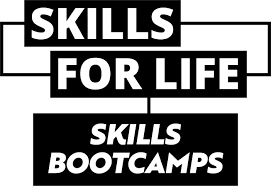 https://www.skillsforcareers.education.gov.uk/pages/training-choice/skills-bootcamp
https://www.skillsforcareers.education.gov.uk/pages/training-choice/skills-bootcamp
Labour Market Information (LMI)
Post-16 Pathways: Our Partnership with Christ the King Sixth Form Colleges
At St. Paul’s Academy, we are committed to ensuring that every student is well-prepared for life beyond Year 11. A key part of this commitment is our strong partnership with Christ the King Sixth Forms (CTK), which are our designated post-16 partner schools.
This partnership provides our students with a clear and supportive pathway as they move into the next stage of their education. Christ the King Sixth Forms are well known for their high standards, supportive environment, and wide range of academic and vocational courses. Together, St. Paul's and CTK work to give our students the best possible opportunities to succeed.
What this means for your child:
-
St. Paul’s students are encouraged and supported to consider CTK as a natural next step after Year 11.
-
They benefit from a smooth transition into post-16 education, with familiar support and guidance along the way.
-
Students receive clear information and advice about the application process, entry requirements, and course options.
-
Through CTK, students can access a wide network of university links, apprenticeships, and career pathways.
If your child is currently in Year 11, we strongly recommend visiting the Christ the King Sixth Forms website for the latest updates on applications, courses, open events, and opportunities.
This partnership ensures that your child’s journey beyond St. Paul’s Academy continues to be guided, ambitious, and full of potential.
 |
Christ the King Sixth Forms (CTK) remain a highly valued partner of St. Paul’s Academy. Our collaboration continues to grow stronger, creating new opportunities to support our students both academically and personally. From the 2025–2026 academic year, we will introduce A-Level Masterclasses, designed to broaden pathway options for our GCSE students and help families make well-informed decisions about their child’s post-16 education. We are also proud of our developing mentoring partnerships. Past St. Paul’s students already return to support Key Stage 3 pupils through our reading programmes, and this will be further expanded with CTK St. Mary’s Sixth Form. Here, Year 11 students will benefit from alumni-led support in English, Mathematics, and Science tuition, giving them additional guidance and inspiration as they prepare for their next steps. |
https://www.ctk.ac.uk/
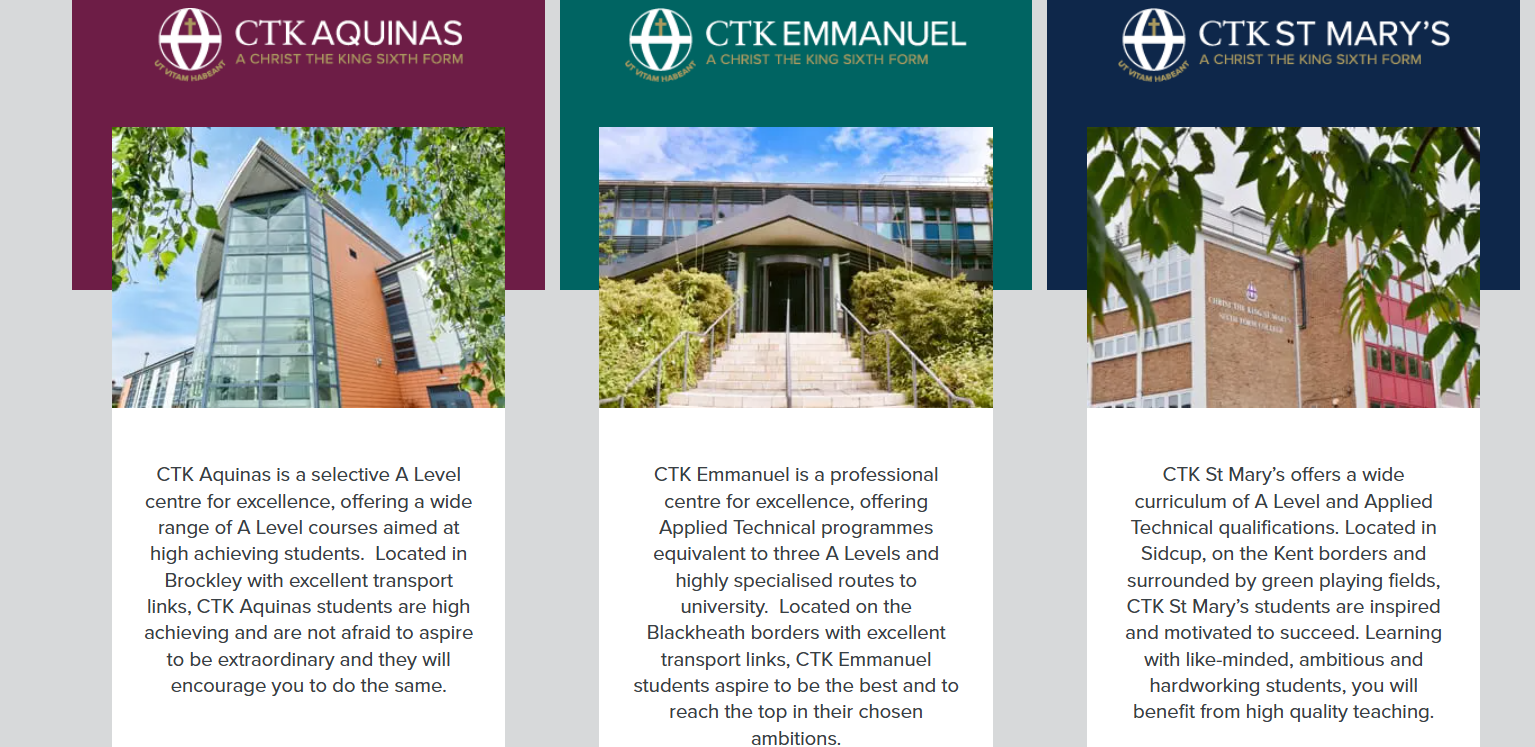
St Paul’s Further Education Community
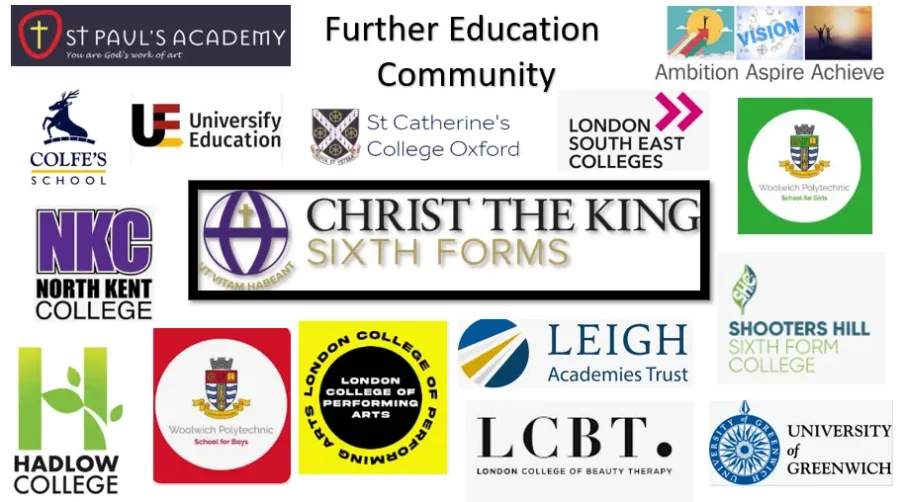
Post-16 Education
Once students have gained self-awareness and developed a strong sense of occupational awareness, during Years 10 and 11 they will need to turn their attention to their Post-16 Options. Full-time education is one of the key paths available to them.
Navigating Post-16 education requires a wealth of information, advice, guidance and support. Students must understand the differences between the various courses on offer, including Entry Level, Level 1, Level 2, and Level 3 qualifications—such as A Levels, BTECs, T-Levels, and the International Baccalaureate Diploma. Key details, such as entry requirements, course content, course length, and progression routes, will be crucial in making well-informed decisions. Students should also be familiar with their local colleges and sixth forms as well as those further afield, and be aware of the factors to consider when selecting institutions and courses. Details of college and sixth form open events, along with knowledge of potential interview questions, will be important to have during the decision-making and application process.
Below, you'll find all of this essential information, along with recommendations for additional resources that can support students in their research.
Post-16 Options – Qualifications Explained
Courses Available Post-16 at College and Sixth Forms
Sixth Forms and Colleges – Factors to Consider and Useful Websites and Resources
Sixth Form and College – Useful Information Booklet
Sixth Form and College Open Events for 2026 Entry
Sixth Form and College Interviews
Apprenticeships
Apprenticeships, which offer a real job that enables individuals to earn while they learn, gaining valuable knowledge, skills and behaviours tailored to a specific job role. There are over 700 apprenticeship standards currently approved for delivery, from Level 2 to degree level.
Another key Post-16 option for Year 10 and Year 11 students to explore is apprenticeships. It’s important for students to understand how apprenticeships work, as well as the different levels available, including Post-18 options like higher and degree apprenticeships. They should be aware of application timelines, the process for applying, and how to search for apprenticeship vacancies. Access to both local and national apprenticeship opportunities and contacts is essential for vacancy searching.
Below, you’ll find detailed information on all of the above, helping students to compare the full-time education option against the training apprenticeship option, and this will also help students decide which path is best suited to their individual goals and aspirations.
Apprenticeships Explained
How to Become an Apprenticeship
Different Levels of Apprenticeships
Apprenticeships – Useful Information and Websites
 https://www.apprenticeships.gov.uk/
https://www.apprenticeships.gov.uk/
 https://download.apprenticeships.education.gov.uk/apar
https://download.apprenticeships.education.gov.uk/apar
Degree Apprenticeships
UCAS – Apprenticeship Information
Apprenticeships – List of Possible Local and National Contacts
Higher Education
After completing Post-16 education or training, students can choose from several pathways: pursuing a Post-18 higher or degree apprenticeship, enrolling in a higher education course, entering the workforce, or joining a school leaver programme with an employer. Some may opt for a gap year before deciding on their next steps. Statistically, most students who take a gap year eventually go on to pursue higher education, such as a degree or foundation degree.
Below, you will find information on why many students choose higher education, and details about the prestigious Russell Group, higher education finance, and opportunities to study abroad, while many students are drawn to study in the USA, this option is just one of many. We also provide a list of helpful higher education websites to support students in their research and decision-making process.
Why go to University?
 https://www.discoveruni.gov.uk/
https://www.discoveruni.gov.uk/
 https://www.unitasterdays.com/university-subject-guide-videos/
https://www.unitasterdays.com/university-subject-guide-videos/
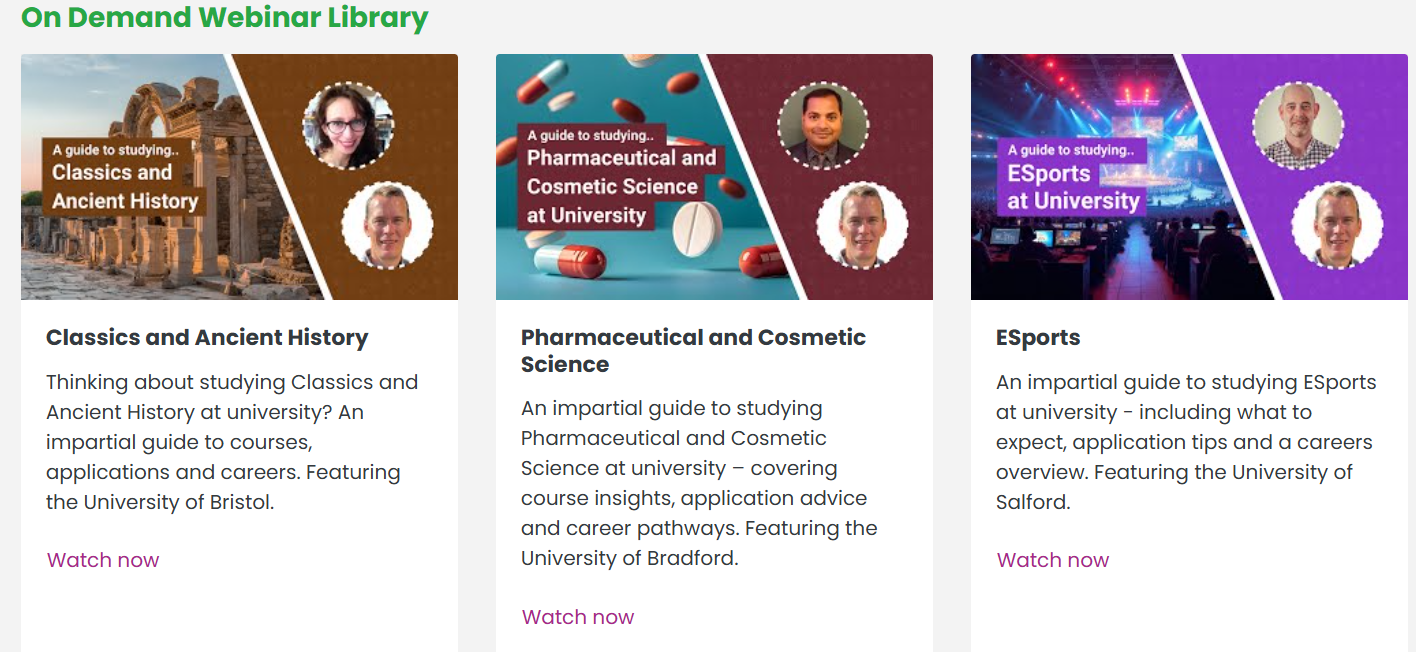
The Russell Group
Higher Education Finance
Useful Higher Education Websites
Studying abroad
Studying in the USA
Applications
At various stages of their lives, students will begin searching and applying for jobs—whether it’s part-time work at 16 or full-time opportunities after turning 18. Regardless of when they start, students need to know how and where to search for jobs, how to craft an effective CV, and, for some, how to prepare for assessment tests. Almost all students will eventually need to prepare for job interviews.
Below, you’ll find useful information and advice for young job seekers, tailored to whichever stage they’re at in the application process.
Part-time Job Search
Job Search for Young People
How to Prepare a CV
Assessment Tests
How to Prepare for an Interview
Useful Links
 https://careermap.co.uk/career-advice/careermag
https://careermap.co.uk/career-advice/careermag
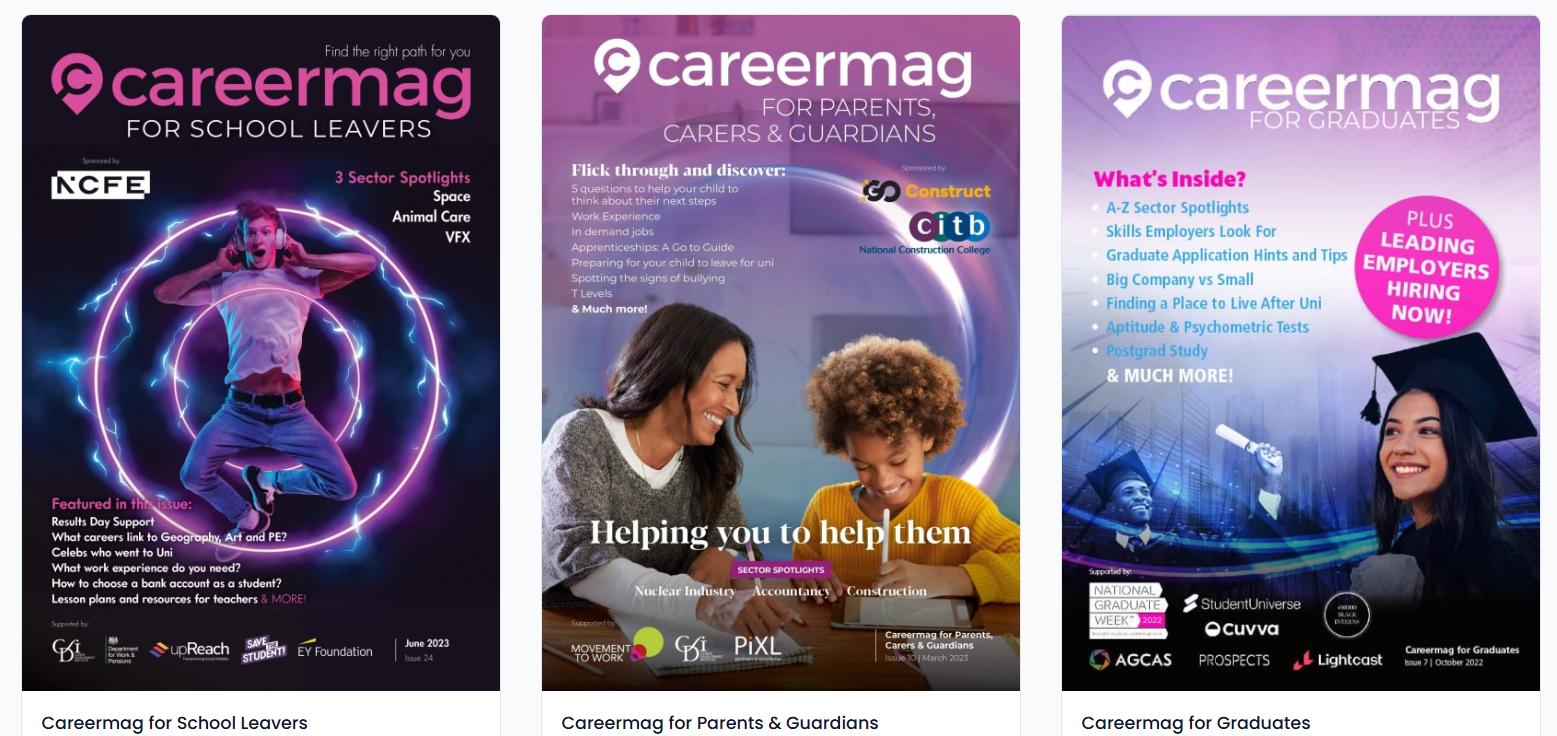
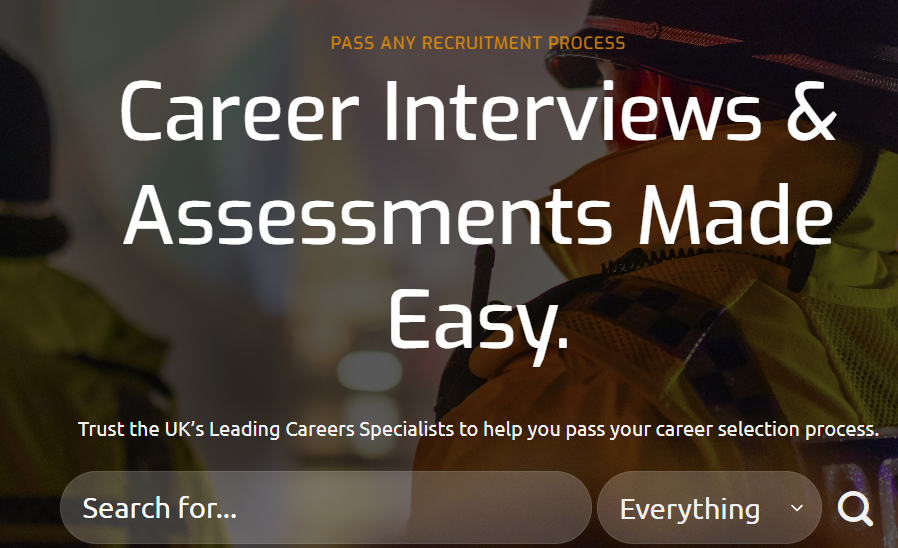
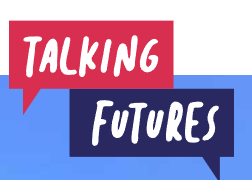 https://www.talkingfutures.org.uk/
https://www.talkingfutures.org.uk/
A website aimed at you as parents about career topics and pathways to further education.
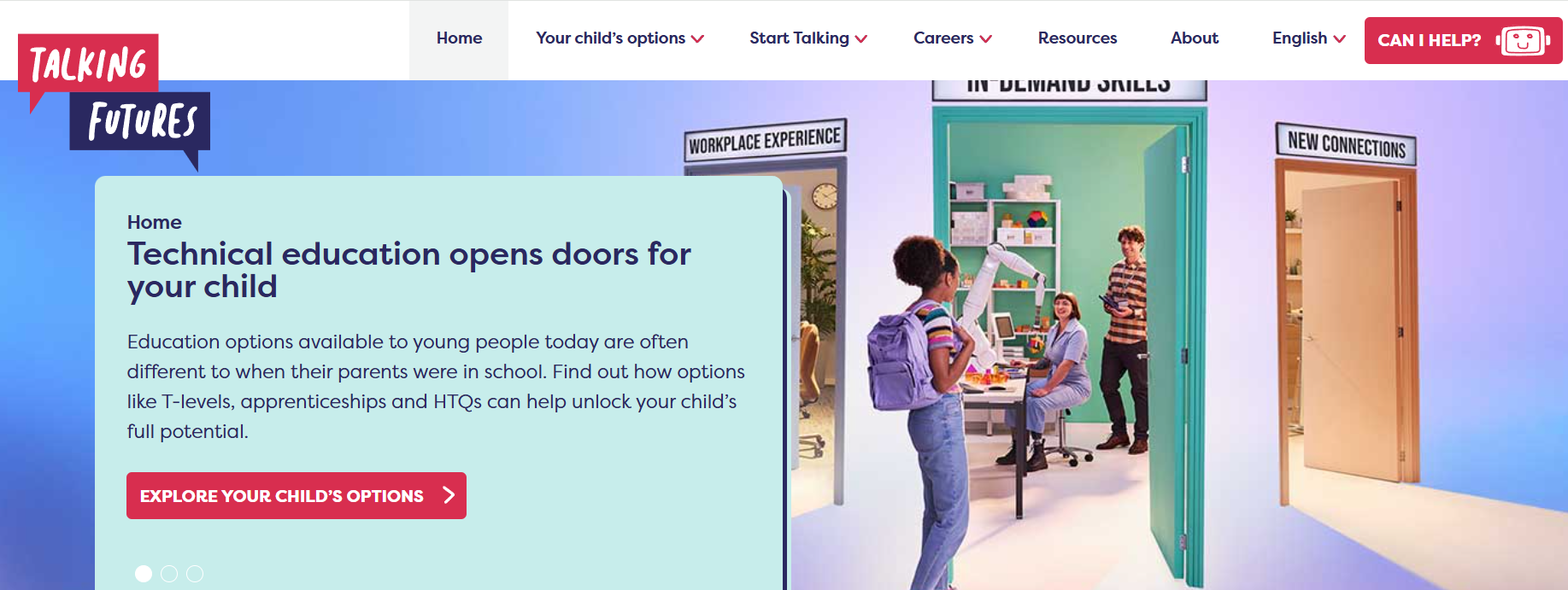
 https://www.skillsforcareers.education.gov.uk/
https://www.skillsforcareers.education.gov.uk/
A parents section with advice and resources on training options for your child's future.
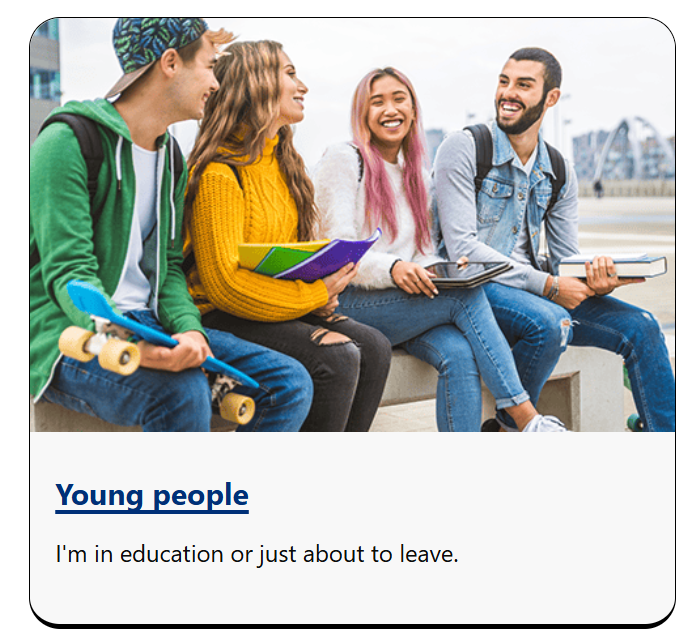
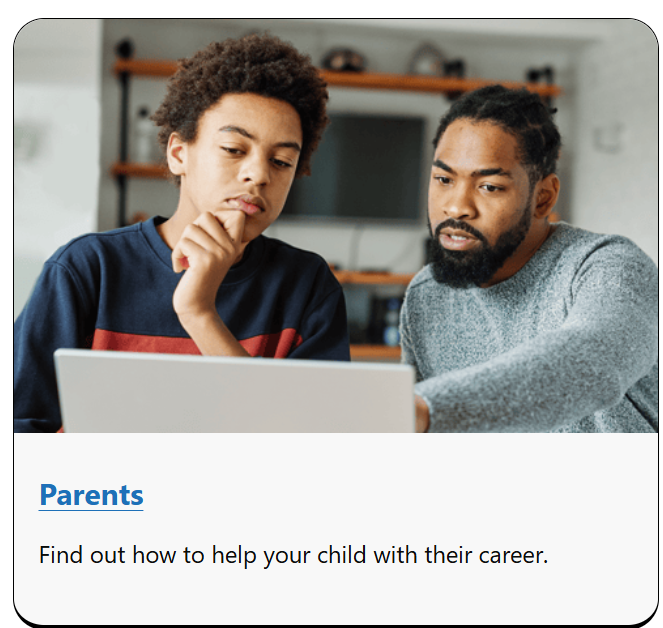
The latest learning on engaging parents and carers in careers education
Parents and carers are the biggest influencers on a child’s careers decision-making. CEC resources are designed to support you in effectively engaging them and encouraging meaningful career conversations with your children.
Together with Causeway Education, the Careers and Enterprise Company have created two short CPD sessions, designed to assist the development of a progressive, targeted and integrated approach. The sessions take just one hour each to complete, meaning you can learn on your lunch!
Parent and carer engagement - CPD session 1
Planning for Parent/Carer Engagement
Parent and carer engagement - CPD session 2
Developing and Embedding a Whole-Institution Strategic Approach
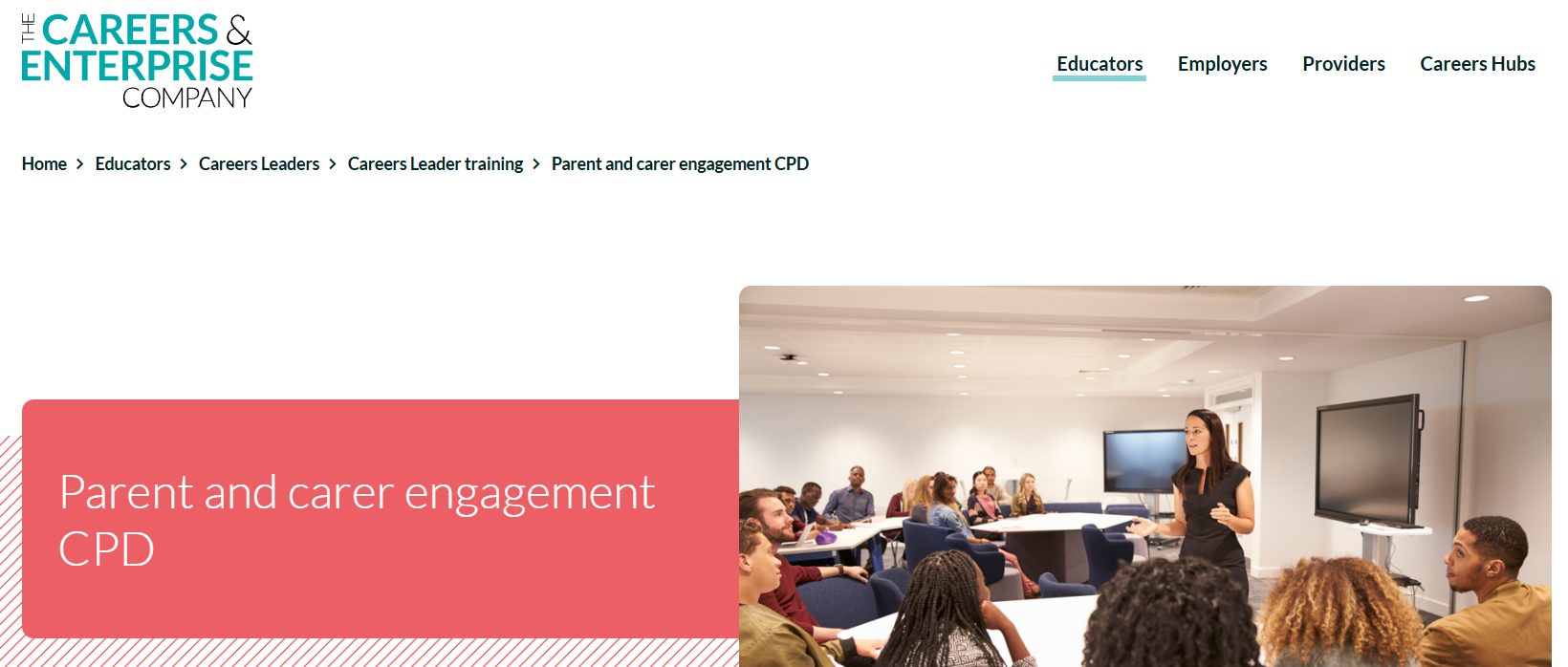
Other useful links:
- the National Careers Service
- the government’s Discover Uni website, which helps users search for and compare information and data for individual undergraduate courses across the UK, alongside researching other sources of advice they may need, such as application and funding information

🔍 What is Unifrog?
Unifrog is an online platform designed to help students at St Paul's make informed decisions about their future education and career paths. It provides a structured, interactive way for our school to deliver effective careers guidance in PSHE and form time, making it a useful tool for meeting the Gatsby Benchmarks — the framework used in the UK to ensure high-quality careers provision in schools and colleges.
Log on to Unifrog with your child
Student guide to gaining access to Unifrog
Unifrog is a digital careers platform that:
-
Helps our students explore post-16 and post-18 options (apprenticeships, university, employment, etc.).
-
Offers career and personality quizzes to tailor aspirations for transition beyond St Paul's Academy.
-
Provides tools to compare university courses, apprenticeships, and college options.
-
Facilitates the creation of CVs, personal statements, and application materials.
-
Allows teachers to track student progress and provide guidance bespoke to their needs.
Parent support: Launching Unifrog with Your Child
Careers Education at St Paul’s Academy
At St Paul’s Academy, we deliver a dynamic careers programme through our PSHE curriculum and form time program, built on a spiral model that grows with our students. Using the Unifrog platform, we provide engaging, age-appropriate content that helps students explore their interests, build essential skills, and make informed decisions about their futures.
From Year 7 through to Year11, students revisit key themes such as personal strengths, employability, and pathways beyond school to Post-16 and Post-18 —each time with greater depth and relevance. Unifrog’s powerful tools support this journey with interactive quizzes, career and course libraries, and step-by-step guidance on university, apprenticeships, and more.
Our goal is to ensure every student is prepared, confident, and ambitious in the face of a fast-changing world of work.
Unifrog Events 2025-2026 for Students and Parents
Year 10 Work Experience Week – Monday 20th April to Friday 24th 2026
SPA Work Experience Policy 2025
SEND Work Experience Policy 2025
As part of our commitment to preparing students for life beyond the classroom, we are excited to offer Year 10 students the opportunity to take part in Work Experience Week, running from Monday 20th April to Friday 24th April 2026.
Work experience offers students a valuable chance to:
-
Gain real insight into the world of work
-
Build practical skills and confidence
-
Explore future career options
-
Strengthen CVs and applications for further education, apprenticeships, or employment
How Families Can Support
We encourage students to find a placement that matches their interests—and we welcome your support in helping them do so. Once a placement is arranged, the employer must complete an Own Find Form, detailing the role, supervision, and insurance coverage. This form must be submitted by Friday 24th October 2025.
Own Find Form 2025-2026
Important:
-
All employers must hold Employer’s Liability Insurance to take part in the Lewisham Work Experience Scheme.
-
The form must be filled out completely, with all shaded sections completed by the employer.
-
The form must be brought back to school and placed in the Work Experience box in reception. This will then be scanned to the Lewisham Work Experience Team for processing.
To help students reach out to potential employers, we’ve shared helpful resources on Google Classroom—please encourage your child to use them when making contact.
Support Available
Our Year 10 Pastoral Team and Work Experience Coordinator, Paul Goddard, are here to support both students and families throughout the process. We’re also posting available opportunities on Google Classroom, so be sure to check in regularly. Please see the website and contact details below for the Lewisham Work Experience Team as our wider provider:
 https://schoolsservices.lewisham.gov.uk/Page/7238
https://schoolsservices.lewisham.gov.uk/Page/7238
Support for students and parents:
Finding your own work experience placement
How to write a business letter to an employer
How to make a phone call to an employer
If you have any questions or need help at any stage, please don’t hesitate to get in touch.
Please see the list of our 2024-2025 Work Experience Partners for Year 10 below.

Benchmark 7: Encounters with further and higher education
All learners should understand the full range of learning opportunities that are available to them, including academic, technical and vocational routes. This should incorporate learning in schools, colleges, ITPs, universities and in the workplace.
-
By the age of 16, every learner should have had meaningful encounters with providers of the full range of learning opportunities, including sixth forms, colleges, universities and ITPs.
Discover T Levels – A New Pathway to Success
T Levels are exciting new qualifications, developed with businesses, that give young people the skills, knowledge, and confidence to thrive in the workplace. They are a high-quality alternative to A Levels, offering a full Level 3 programme equivalent to three A Levels.
With 20 subjects to choose from, students study a wide range of content related to their chosen sector, with opportunities to specialise in areas that interest them most. Each T Level also includes a 45-day industry placement, giving students valuable hands-on experience in a real working environment.
T Levels open doors to university, apprenticeships, or skilled employment, making them an excellent choice for ambitious students ready to take the next step in their journey.
Parents and students can explore local T Level providers and subject options by visiting the official T Levels website.
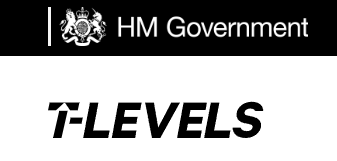 https://www.tlevels.gov.uk/
https://www.tlevels.gov.uk/
Reformed Technical Qualifications – New Routes for Career Success
From September 2025, young people will have access to new reformed technical qualifications, designed to give them the skills and confidence to succeed in their chosen careers.
-
At Level 3 (equivalent to A Levels), these qualifications are available for 16–19 year olds in careers not already covered by T Levels.
-
At Level 2, reformed qualifications will be available in most subject areas (except digital), helping students to take their first step into a chosen sector.
These qualifications focus on real occupational skills, preparing students either to move straight into work or to continue progressing in education.
Students can also choose specialist technical qualifications at Level 2 or Level 3. These allow learners to deepen their knowledge, gain extra skills, and specialise within a sector, building on what they’ve already learned through a Level 2 qualification, a T Level, or another Level 3 technical course.
The first reformed qualifications will be introduced in:
-
Construction
-
Digital
-
Education and Early Years
-
Engineering and Manufacturing
-
Health and Science
These new qualifications give students more opportunities than ever to prepare for higher education, apprenticeships, or employment in sectors where skilled workers are in high demand.
Higher Technical Qualifications (HTQs) – A Pathway to Skilled Careers
Higher Technical Qualifications (HTQs) are new, high-quality qualifications at Level 4 and 5 (just above A Levels or T Levels). They have been specially approved by employers to make sure they give learners the skills and knowledge needed for today’s jobs.
HTQs are available at:
-
Universities
-
Further Education colleges
-
Institutes of Technology
-
Independent Training Providers (ITPs)
These courses are designed to prepare students for a wide range of specialist occupations, giving them the practical skills that employers value most.
For students, HTQs offer a great option to:
-
Gain a highly respected technical qualification after school or college.
-
Access careers in specialist industries where skilled workers are in demand.
-
Progress to further study, an apprenticeship, or directly into work.
Parents and students can explore where HTQs are available by checking the list of providers across England.
 https://www.htqtoolkit.co.uk/
https://www.htqtoolkit.co.uk/
Supported Internships are work-based study programmes designed for young people aged 16 to 24 who have an Education, Health and Care Plan (EHCP).
They give young people the chance to:
-
Gain real experience in the workplace
-
Learn the essential skills needed for employment
-
Get support from job coaches and tutors along the way
Some programmes may also offer the opportunity to work towards a qualification.
👉 For parents: Supported internships can be a valuable step in helping your child move from education into employment, giving them the confidence and skills to progress towards greater independence.
👉 For students: A supported internship gives you the chance to try out a real job, learn new skills, and get support to help you succeed in work and life.
Below you’ll find useful resources to support you and your child throughout the school year with careers events.
These include Unifrog resources, which help at key transition points in your child’s journey at St Paul’s Academy – from Year 9 Options through to Post-16 and Post-18 choices.
If you have any questions, please don’t hesitate to get in touch with the Careers Team listed above.
We hope these links and resources will be helpful in guiding your child through their educational and career journey at St Paul’s Academy.



